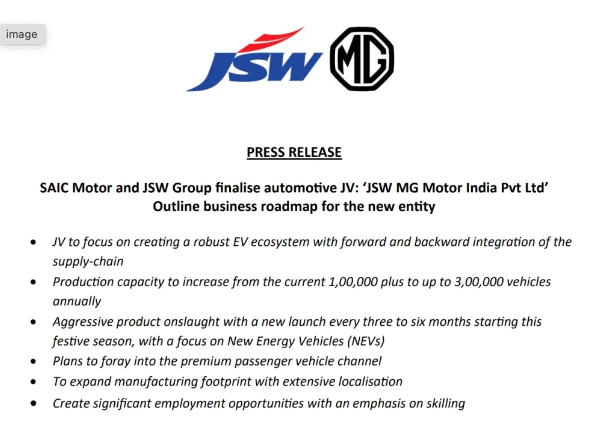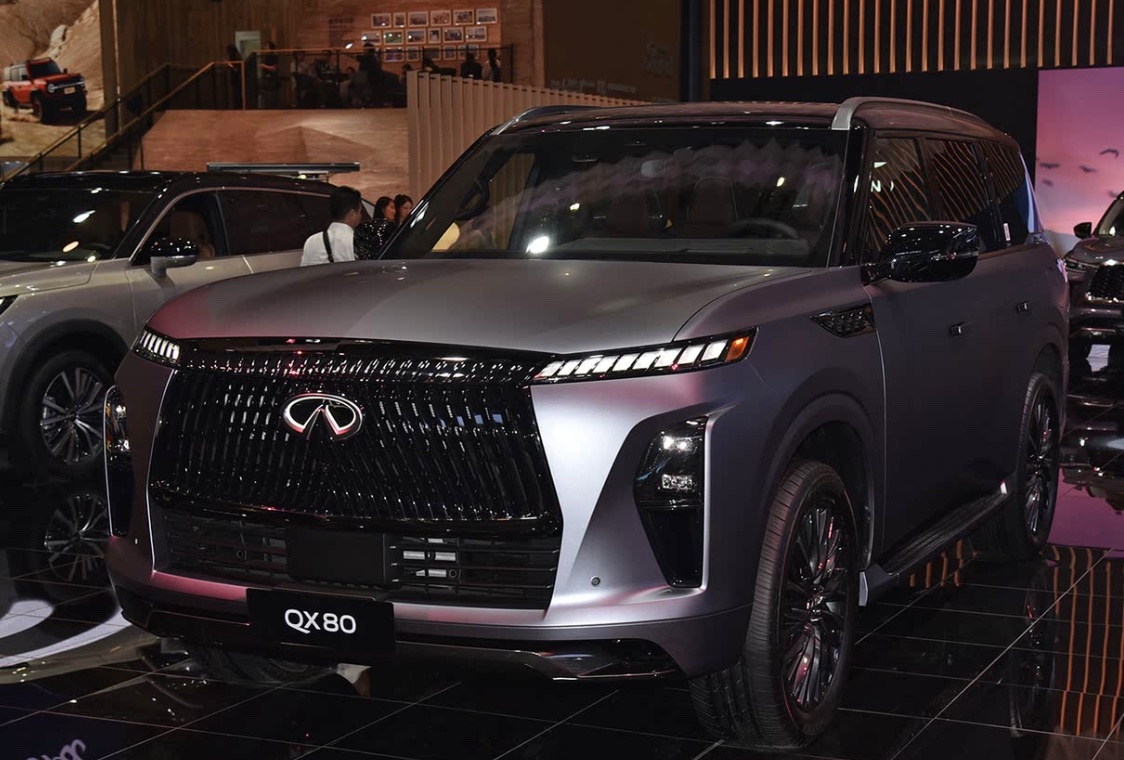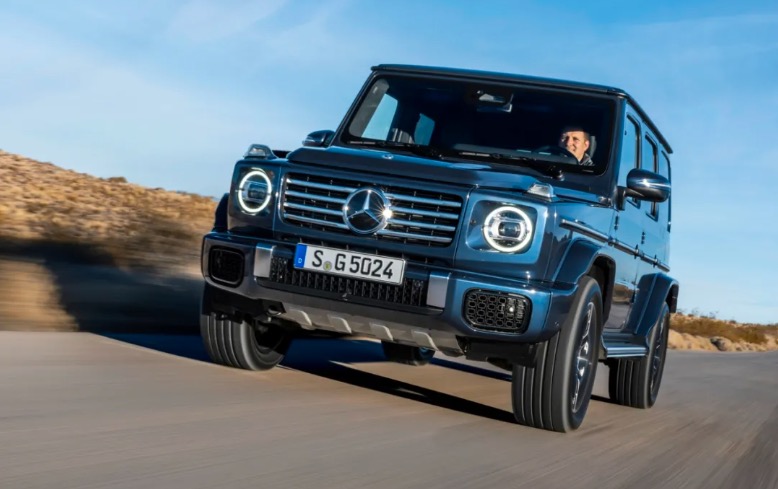Local time Wednesday, India’s largest steel producer, Jindal Southwest Group (Jindal Southwest, referred to as JSW) announced that it will form a joint venture with China’s largest automaker, SAIC, JSW MG Motor India.

It is understood that the valuation of the joint venture is about $1.5 billion, and it will produce and sell MG brand electric vehicles in India, planning to launch a new product every 3-6 months. The goal of this joint venture is to increase its share in the Indian new energy vehicle market from 2% to 33% by 2030, and plan to sell 1 million electric passenger vehicles that year. JSW hopes to reduce costs through localized production while increasing the degree of localized R&D, with the goal of achieving full localization, including R&D, by 2030.
JSW Group Chairman Sajjan Jindal said the group has been looking for opportunities to enter the Indian auto market, and the rise of new energy vehicles has given it an entry opportunity. And MG’s technological advantage makes it a good partner. In terms of market competition strategy, Jindal believes that the joint venture may follow Maruti Suzuki and seek a breakthrough in market share by quickly launching models.
What is of concern is actually the proportion of equity. It is understood that JSW MG Motor India, the joint venture, is owned 35% by the JSW group, and financial institutions, auto dealers, and employees will also hold shares, which raises the proportion of the JSW group’s holdings in the joint venture to 51%, giving it control of the joint venture, while SAIC holds 49%. Auto blogger Sun Shaojun said that this partnership itself is the result of the direct snatching of MG India’s equity by the Indian JSW group.
In June 2023, according to the Hindustan Times, the Jindal Southwest Group of India (Jindal Southwest, referred to as JSW) is trying to acquire a stake in MG Motor India Ltd. It is reported that the JSW group will hold 45-48% of the shares of SAIC MG India, and dealers and Indian employees will hold 5-8% of the shares, which means that SAIC will lose control of MG India and its shareholding will be less than 50%. MG India will also become a company controlled by Indians.
In response to this news, SAIC issued a clarification. SAIC said that “SAIC MG India was forced to acquire shares at a low price by the local side, losing control,” and the relevant content seriously deviated from the facts. “SAIC International’s operations strictly abide by the policies and regulations of our country and the countries where overseas businesses are located, fully respect the laws of the market, and fully grasp the autonomy. The shareholding of SAIC in MG India involves the share transaction of MG India, which needs to be approved by the Chinese government. We will release official information in a timely manner.”
SAIC emphasizes that it has not lost control of MG India, but the industry believes that at that time, SAIC had control over MG India. However, the transaction was not completed, or even after SAIC reached a deal with the Indian JSW Group, it still had control.
In October 2023, SAIC and the Indian JSW Group signed a strategic cooperation agreement in London, UK. SAIC will introduce the JSW Group as a strategic investor and further support MG India to expand its market share through the way of increasing capital and expanding shares. The two parties will actively coordinate their respective advantages in the fields of automobiles, steel, and energy to create a mutually beneficial and win-win cooperation model to ensure the sustainable development of MG India. According to the agreement, after the capital increase and share expansion is completed, the Indian JSW Group will own 35% of the equity of MG India. The relevant cooperation plan still needs to be approved by the government.
It is understood that SAIC entered the Indian market as early as 2017, invested 3.275 billion yuan to establish MG India Automobiles Co., Ltd. in India alone, and achieved mass production and sales by acquiring the Halol factory of General Motors India Limited. SAIC also became the first Chinese automaker to enter the Indian market. Since the production of the Halol factory in 2019, MG India has launched a variety of automotive products, most of which are assembled locally in India. In 2023, MG’s sales in India were about 60,000, an increase of nearly 25% compared to the previous year, achieving growth for four consecutive years. However, the overall market share is not high, and its market share in the electric vehicle market (2%) is far lower than that of the leading Tata Group (70%).
What is the background of JSW? It is the largest steel producer in India. In addition to the steel industry, it also involves energy, infrastructure, cement, real estate, etc., which have nothing to do with automobiles, that is, there is no automotive technology to speak of. And SAIC’s cooperation with such a company to form a joint venture requires SAIC to build it by itself, whether it is production, sales, or the supply chain. In other words, the joint venture JSW MG Motor India appears to be jointly funded by the JSW Group and SAIC, but the actual dominance lies with JSW. JSW not only has the sales rights of the joint venture, but SAIC also needs to help JSW establish an electric vehicle production line and supply chain.
Only with a body can there be a soul. More deeply, the MG brand electric vehicles produced in India basically come from SAIC in terms of technology, and the soul is in the hands of SAIC. SAIC seems to have the dominance, but MG India was originally a wholly-owned company of SAIC, but now it successfully has the production and sales rights of MG brand electric vehicles, and the body is in the hands of JSW.
If you want to capture the Indian market, a joint venture is an inevitable choice. Currently, the brand with the highest sales in the Indian auto market is Suzuki. It has built a joint venture factory in India and has dominated the Indian auto market for more than 40 years. Now, its market share in India exceeds 50%. In addition to Suzuki, international major car manufacturers such as Toyota, Honda, and Volkswagen have all set up joint ventures in India.
SAIC’s establishment of a joint venture in India is not wrong in itself. If the joint venture is based on fairness and equivalence, it will not cause dissatisfaction among netizens. In general, the Indian market is both attractive and challenging for foreign companies.



